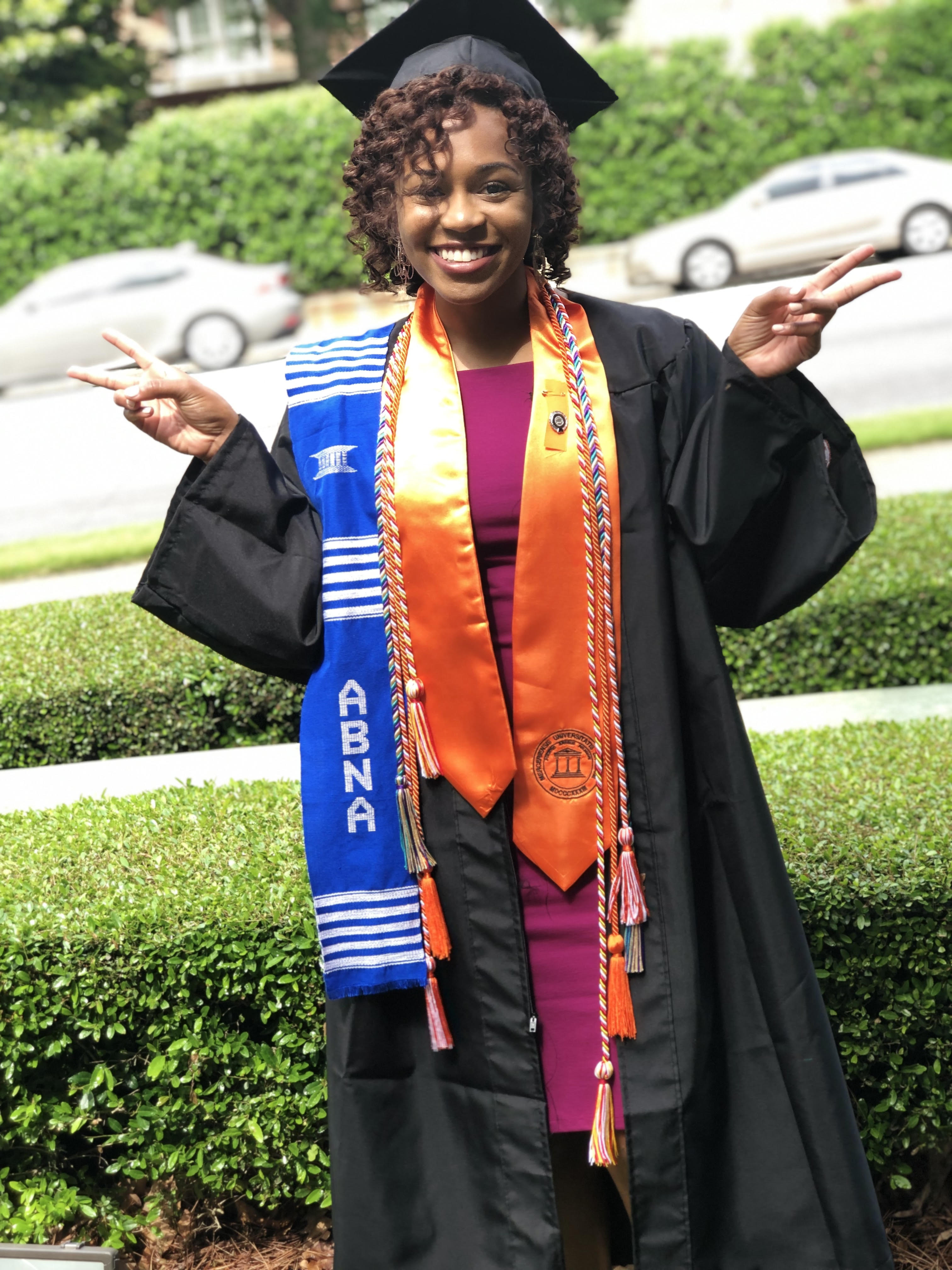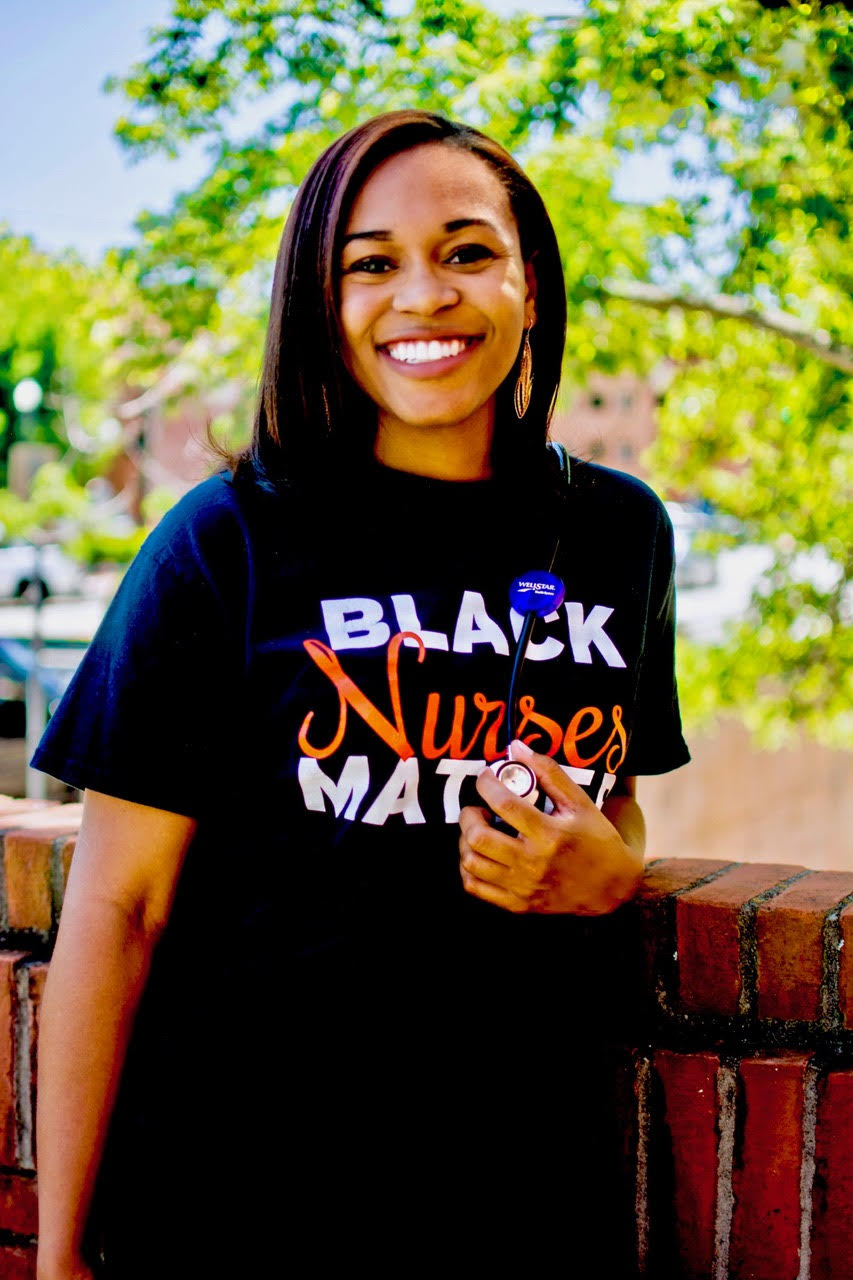“People forget nurses are human. We don’t have special powers.”
Jasmine Garrett, BSN, RN, CEN (Atlanta, GA)
Jasmine Garrett had only been a nurse for a year when the pandemic hit. She previously worked as a health coach for an Atlanta start-up that focused on holistic medicine and was inspired to apply to nursing school. “I shadowed a couple of nurse practitioners, and I really wanted to explore more,” says Jasmine. She respected the way the nurses built relationships with their patients, treating them holistically and shifting their focus from the disease. Jasmine was hired at Wellstar Atlanta Medical Center, a Level 1 trauma center with 460 beds that is known in the Atlanta area for treating patients with COPD. Because of Wellstar’s experience with pulmonary disease, COVID-19 patients flocked to the Wellstar ER at the onset of the pandemic. Jasmine distinctly remembers her first COVID patient. The woman was 70, had no pre-existing conditions, and was found passed out in her home with a 32% oxygen level. Paramedics rushed her to Wellstar. “It kind of jarred me because this woman had no pre-existing conditions, was maxed out on the [oxygen] tank, maxed out on the wall, and her levels were still critically low. I had to ask her to stop talking because every time she talked, her oxygen level would drop.” Medical professionals were just learning and circulating information about the severe hypoxia that the coronavirus brought on; Jasmine was witnessing it firsthand.

Jasmine’s medical center drastically increased the PPE requirements for staff dealing with COVID patients and struggled with limited resources. She recalls, “We were required to re-wear our N95 mask for a minimum of six shifts. We kept them in a brown paper bag and treated them with a UV light between shifts.” The hospital beds filled quickly. “We ran out of isolation rooms and were just separating patients with a curtain.” The shifts were intense. The ICU was overflowing. The reality of the pandemic took its physical toll on Jasmine. “I was in a patient’s room for three hours. I had on my face shield, two masks, and two blue gowns because one didn’t quite cover you. I started feeling nauseous. I had tingling and numbness in my fingers. I felt really lightheaded. I remember the Charge Nurse called my name, and I looked at her. The next thing I knew, I was in a wheelchair, being wheeled out of the hospital through the ambulance bay.” Jasmine had induced hypercapnia from wearing her mask too long and not getting enough oxygen to keep her carbon dioxide levels stable. Because of the limited resources, Jasmine didn’t receive treatment or oxygen at the hospital. She was sent home in the care of her roommate and her fiancé.
Friends and co-workers applauded Jasmine as a hero, but she says that title can be dangerous. “People like painting nurses as heroes, like we’re Superman or Batman and can take anything.” Jasmine says that perception can negatively affect how nurses are treated. “Nurse abuse is very real, and it’s not talked about enough. I’ve known nurses to get punched in the face, to get bitten, to get kicked, and to get spit on, aside from being cussed out on a regular basis. These attacks are tough on your mental health.” Jasmine worries about the lasting impact that the trauma will have on the nursing community. “Everyone goes into health care to help, and I think that there’s a lot of moral injury that can happen in the hospital if you’re taking abuse. It just burns you out faster, and then you’re not an effective clinician.” Jasmine is currently in graduate school to earn her DNP, and after graduation she wants to focus on increasing ways to support nurses at the bedside. “People forget nurses are human. We don’t have special powers. When we encounter these things, we all suffer.”

Jasmine is already taking steps to effect change. Haunted by the injustice of the Breonna Taylor murder, she started a scholarship at her university to promote diversity in nursing. “When I was in nursing school, 2% of the nurses were African American, which is crazy to me because studies show that positive patient outcomes are increased when patients share the same racial identity as their health care provider.” Jasmine wanted to ensure Breonna Taylor didn’t pass away in vain. “I really connected with Breonna because she was an emergency care technician like I was when I was in nursing school. I know she wanted to be a nurse at some point, and her co-workers said she did a great job connecting with patients. She was really a light in the hospital; yet, she ended up a victim of police brutality and police violence. We can’t just sweep this under the rug.” Jasmine’s college, Mercer University, embraced her initiative and created the Diversity in Nursing Scholarship Fund to honor Breonna’s memory and increase opportunities for nurses of color. So far they’ve raised over $10,000 and hope to raise $25,000 to create an endowment in Breonna Taylor’s name. “Race and racism play a huge role in recruitment and retention in nursing. I hope this will be a way to improve opportunities for African American nurses and workforce diversity,” says Jasmine.
#FirstRespondersFirst Microstep
Right now, identify your top “stressor signals” that remind you that your battery is running low.
Learning how to listen to your own particular signals is an important way to guide your microbreaks throughout your day or your shift. Common signals include rapid heart rate, strong negative feelings, difficulty thinking clearly, unnecessary risk taking, and social conflicts. When you notice your signal, take a brief pause to reset so you can be your best at helping others.
Jasmine’s story is part of “Unmasked: Profiles of Humanity and Resiliency,” a collection of stories from the frontlines published by the National Black Nurses Association (NBNA) in partnership with #FirstRespondersFirst. The NBNA offers therapy and wellness services through RE:SET, a free mental wellness program developed for Black nurses to help them RE:SET, recharge and widen their circle of support.
To learn more about the Diversity in Nursing Scholarship Fund, please contact Shawna R. Dooley, Associate Vice President of Advancement at Mercer University: [email protected]


